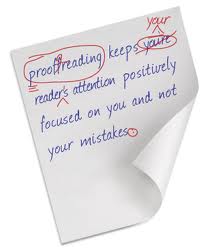Author: Leke Oshiyemi | Source: Jobberman Blog
I can bet most of us have come across what has been referred to as ‘typos’ or ‘errors of ignorance’; which are commonly (and especially nowadays) found (well embedded) in a written matter.
By way of definition ‘errors of ignorance’ are simply put, spelling errors caused by ignorance, while typographical errors (popularly known as ‘typos’) are mistakes made by accident while typing or transcribing something. For the sake of this write-up, I’ll refer to both errors as ‘typos’.
An informal comment posted in an on-line chat, a formal article, a paragraph in a memo, or even a simple comment on a blog, which could have been informative, engaging and even entertaining suddenly, leaves a bad taste in the readers’ mouth as a result of avoidable errors. Some people call them “printer’s devil”.
Nowadays, it’s not uncommon to find mobile phones with ‘QWERTY’ keypads. Mobile devices have made typing-on-the-go an accepted norm and an integral part of the new age/pop-culture. There’s now a good dosage of typing that’s involved in our socio-economic lives. We type away naturally at work and at play; from casual emails/BB chats between friends to concluding major league business transactions.
However, some of us neglect the editing and proof reading of written text because it (sometimes) feel like a ‘JAMB’ examination (for those not familiar with JAMB, it’s a tough qualifying exam to gain admission into a Federal University in Nigeria).
BUT most of us are really not always conscious of the potential dangers of ‘typos’. It’s a known fact that when it’s a written material, you cannot determine how far it can go, or who will read (judge) it. Think about it for a minute and use your imagination as regards who might be reading your written texts.
Let’s use our imagination here; it might be your potential business associates, your boss, your supervisor, your father in-law or your potential employer!
 Due to my job function as Human Resource professional, i have seen many CVs ‘over-flowing’ with ‘typos’! Now, if a candidate has no discipline to proof-read a 2 paged CV (which has been in his/her custody for a while), imagine what your judge (reader) is thinking and concluding about you. Your competence, skill, and ability to deliver on a job could suddenly be under serious review and appraisal behind your back. The unfortunate part is you’ll hardly ever get a chance to defend your ‘typos’. Listen, nobody cares about your excuse for errors! Maybe your eyes were tired or you were distracted before you pressed the ‘send’ or ‘print’ button. Some readers can be very critical/ judgmental you know.
Due to my job function as Human Resource professional, i have seen many CVs ‘over-flowing’ with ‘typos’! Now, if a candidate has no discipline to proof-read a 2 paged CV (which has been in his/her custody for a while), imagine what your judge (reader) is thinking and concluding about you. Your competence, skill, and ability to deliver on a job could suddenly be under serious review and appraisal behind your back. The unfortunate part is you’ll hardly ever get a chance to defend your ‘typos’. Listen, nobody cares about your excuse for errors! Maybe your eyes were tired or you were distracted before you pressed the ‘send’ or ‘print’ button. Some readers can be very critical/ judgmental you know.
Think about this credo for a minute: ‘All grammatical errors have impeding consequences’. Some consequences are trivial and some are serious e.g. heavy wastage of printing papers, loss of ink, loss of time, loss of energy, loss of money, public mockery, damage to company’s reputation, misrepresentation of brand, loss of clientele or a potential job opportunity. Some errors can indeed lead to huge financial loss. (Think about the cost of reprinting an entire day’s newspaper, book, magazine, etc due to errors in print. Some errors can even lead to a lawsuit!).
 A job seeker recently posted this on a group discussion page on LinkedIn in response to a job advertisement/discuss: “Hi, Iam interestingly, kaindly snd job referees number to my emailing inboz: [email protected]. I anm an gradute of ___University. I will appreciate employment with your comanies!” (And so on and so forth). Unknown to our friend, some Human Resources recruitment experts (my friends) were following the thread of conversation. One of the recruiters called me afterwards to say “Leke, you won’t believe what I’m about to tell you, this particular lady was penciled down for a role within our company, but her ‘typos’ have just killed her chances with our organization”.
A job seeker recently posted this on a group discussion page on LinkedIn in response to a job advertisement/discuss: “Hi, Iam interestingly, kaindly snd job referees number to my emailing inboz: [email protected]. I anm an gradute of ___University. I will appreciate employment with your comanies!” (And so on and so forth). Unknown to our friend, some Human Resources recruitment experts (my friends) were following the thread of conversation. One of the recruiters called me afterwards to say “Leke, you won’t believe what I’m about to tell you, this particular lady was penciled down for a role within our company, but her ‘typos’ have just killed her chances with our organization”.
Yeah, I know some folks will think this “typo” judgement thing is too harsh or unfair. I must admit at this juncture that even I make typo mistakes sometimes too. Nobody is infallible (Disclaimer! Even this article has some typos!-Yeah, I know. Lol).
But, seriously speaking; we don’t know who is judging our typo(s) or the degree of loss that can potentially follow an “innocent typo”. And while we can get away with some errors in our letters, emails, memos, BB chats, tweets, FB comments, LinkedIn group comments, profile updates, websites, blogs, magazines, books etc.; nonetheless, there are potential consequences. (Either known to us or unknown to us)
The point I’m making here is. Let’s all try harder to painstakingly read through before we push the send/print button. “Being too casual in your writing can (potentially) make you a casualty”.
- Read that e-mail over again before pressing the ‘send’ button.
- Type and edit it first on MS-Word before you post that comment on-line.
- Ask your friend to help you proof-read before you send that email or written text.
- If it’s not already in the ‘urgent and important’ quadrant. Why not type it, save it, read it another time before you send it.
- Use spell checker on Microsoft word to review the document before you print/send it. Use F7 function key (MS-Word).
- Try reading it aloud before you post it. (Works wonders for me).
- If in doubt, use your dictionary or Google to check the correct spelling. (Smart thing to do).
- When you’re typing, look up every once in a while and monitor your progress. If you notice a word is spelt incorrectly, fix it right away instead of waiting for spell check.
- Use the zoom-in function during proof-reading. Read it over in font size 18 until you’re done proofreading the document.
- Never ignore the red or green wiggly line that appears under misspelled words and incorrect grammar when you type. This can practically save your career.
About Leke Oshiyemi: Leke is a Career Coach|Talent Management| Recruiter | Conference Speaker : Personal Effectiveness and Social Media. Connect with him | twitter: www.twitter.com/lekeoshiyemi | LinkedIn: www.linkedin.com/in/lekeoshiyemi

